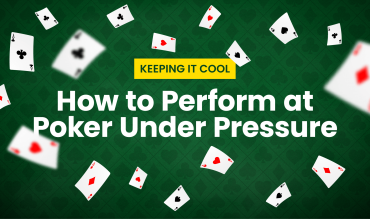Few moments are as pulse-poundingly intense as the final reveal at a poker table.
There’s a reason why those all-important cards-on-the-backs showdowns have appeared in everything from Friends to Star Wars. They’re a time for rivalries to be resolved, and emotional stakes to be raised.
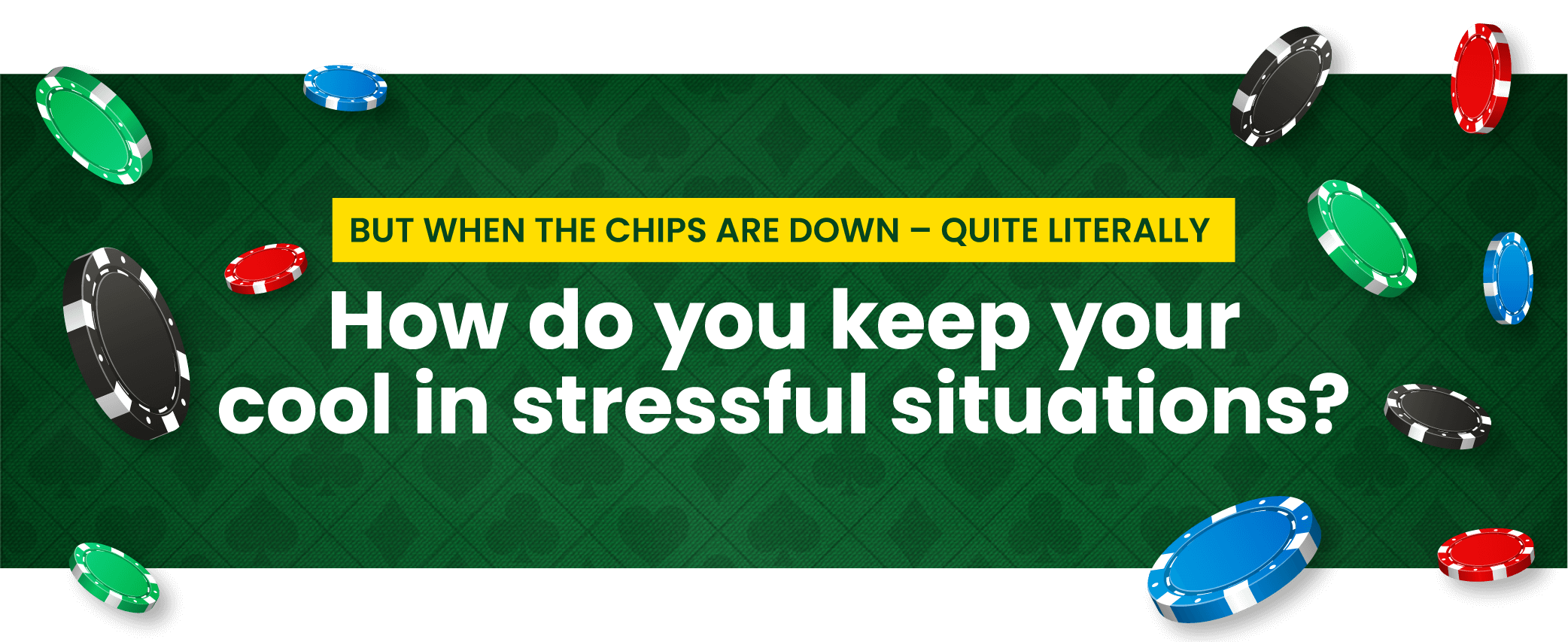
But when the chips are down – quite literally – how do you keep your cool in stressful situations?
High quality poker is all about keeping calm under pressure, not giving yourself away and having the right mindset, whatever the next turn reveals.
Maintaining your composure isn’t just a trait that will serve you well at the poker table either. Professionals from all walks of life benefit from having the ability to stay cool when the heat is turned up.
That’s why we’ve compiled these expert tips on performance and decision-making under stress, so you can keep calm and composed the next time you’ve got a tough call to make.
Stress For Success
Stress can often feel like a proper hindrance in our day-to-day lives. Whether it’s a looming deadline or a long-awaited house move, stress can do a number on us physically, mentally and emotionally.
Fascinatingly, however, research from the University of California, Berkeley shows the importance that a little stress can have in our lives. It can actually help sharpen performance too.
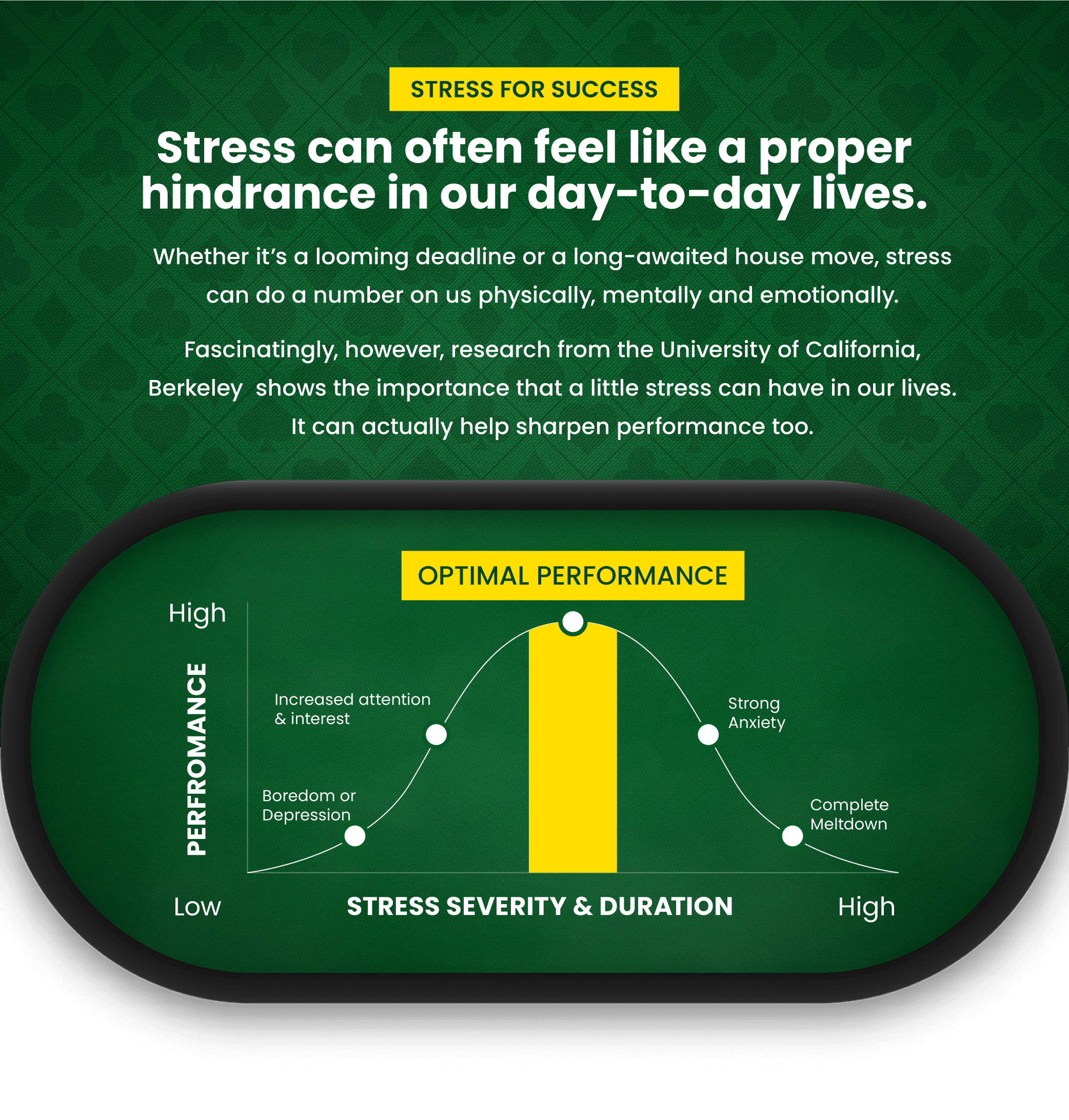
“You always think about stress as a really bad thing, but it’s not,” Daniela Kaufer, of the University, explained. “Some amounts of stress are good to push you just to the level of optimal alertness, behavioral and cognitive performance.”
According to the research conducted by Kaufer and Elizabeth Kirby, the brain’s experience of a short duration of stress actually primes it for improved performance. The study does stress (sorry!) that performance improves only after a short stressful event – the jury’s still out over the effects of long-term stress on performance.
Key takeaway: When the chips are down, don’t worry about a little bit of short-term stress. Embrace it in fact. It might just help you stay alert.
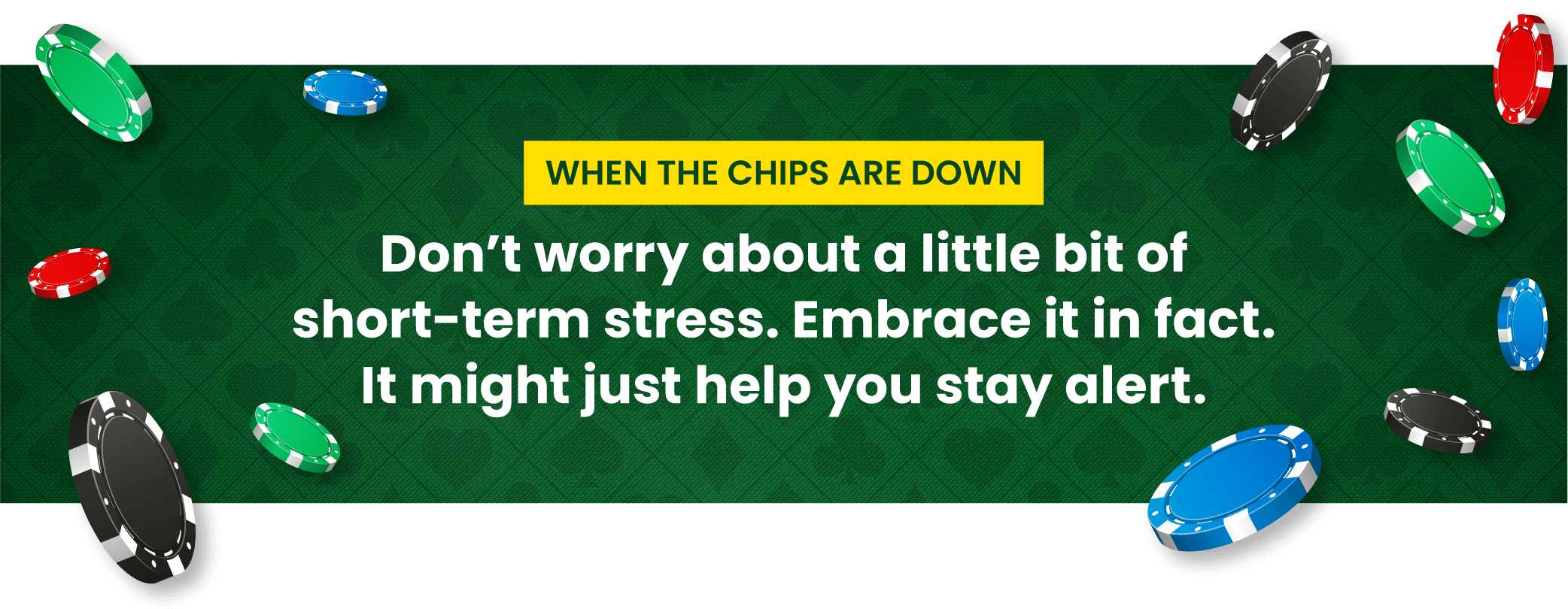
Tick, tock…
Ola Svenson and A. John Maule have looked at research from several key studies about how time pressure and stress combine to affect our decision-making skills. And their findings, compiled in a book, make for compelling reading.
In the snappily titled (but very appropriately titled) “Time Pressure and Stress in Human Judgment and Decision Making” , the authors conclude that “under time pressure, people weigh negative information more heavily.”
But what exactly does this mean? And why does this interpretation of risk-avoidant behaviour have such huge potential consequences at the poker table?
Well, one of the base assumptions about the progress of a poker hand is that you don’t have all the information in front of you. According to the book’s authors, this means there’s a risk of unconsciously concluding you’ve got the weaker hand and potentially folding, rather than looking for more positive evidence and taking a risk on the outcome.
“When the level of stress is very high, a decision maker is more likely to display premature closure,” they note – “making a decision without generating all the available alternatives.”
If faced with a high-pressure situation, poker players may therefore make decisions sooner than they need to due to stress. But without considering all outcomes, the quality of these decisions could be worse.
Key takeaway: Take time to consider your options when weighing up whether to call, raise, fold etc. Your natural impulse may be to fear the worst, but it’s worth looking of evidence that you’re in the stronger position, as well as evidence that you’re outmatched.
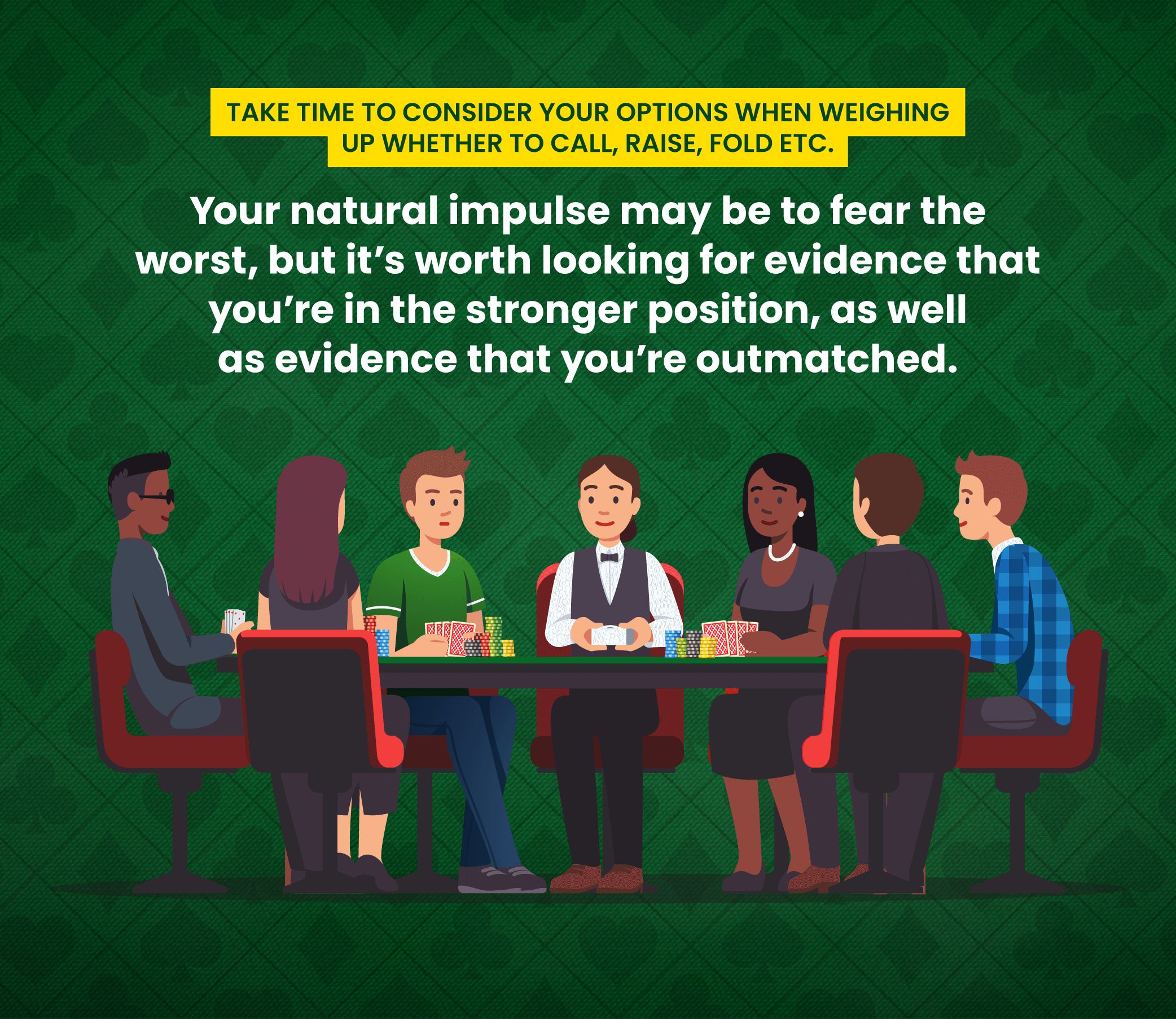
Choking hazard
Another theory explored by Hendrie Weisinger and J. P. Pawliw-Fry in their book “How to Perform Under Pressure: The Science of Doing Your Best When It Matters Most” (Hodder & Stoughton, 2015) is that of the ‘Singularity’.
Sounds exciting doesn’t it? And it kind of is.
The idea with the Singularity is that when you’ve only got one shot at performing in a high-pressure moment, this can exacerbate the feelings of risk and loss.
When you’re too attached to an outcome, the extra pressure you put on yourself can have a negative impact on performance, and potentially cause you to ‘choke’ under pressure.
Simon Dunne and his colleagues explored this notion of choking in a 2019 paper, which recommends reframing the potential reward to boost your performance.
“…[W]hen participants interpreted the incentive as a potential monetary gain they choked under pressure…their performance at the highest level of incentive was significantly worse than their performance at its peak. However, when they reappraised the incentive as a potential monetary loss, this choking effect was significantly reduced.”
In poker terms, this means that playing for a big pot can affect performance and cause players to potentially choke. However, seeing that same big pot as an amount to try not to lose, rather than to win, can actually reduce the negative effect. Work by Vikram Chib echoes this exact same sentiment. If anything, this phenomenon – known as ‘cognitive reframing’ – can help your confidence at the table.
Key takeaway: Thinking of the pot as what you’ve already won, rather than what you could potentially win, can help you shake off the prospect of choking at the worst possible moment.
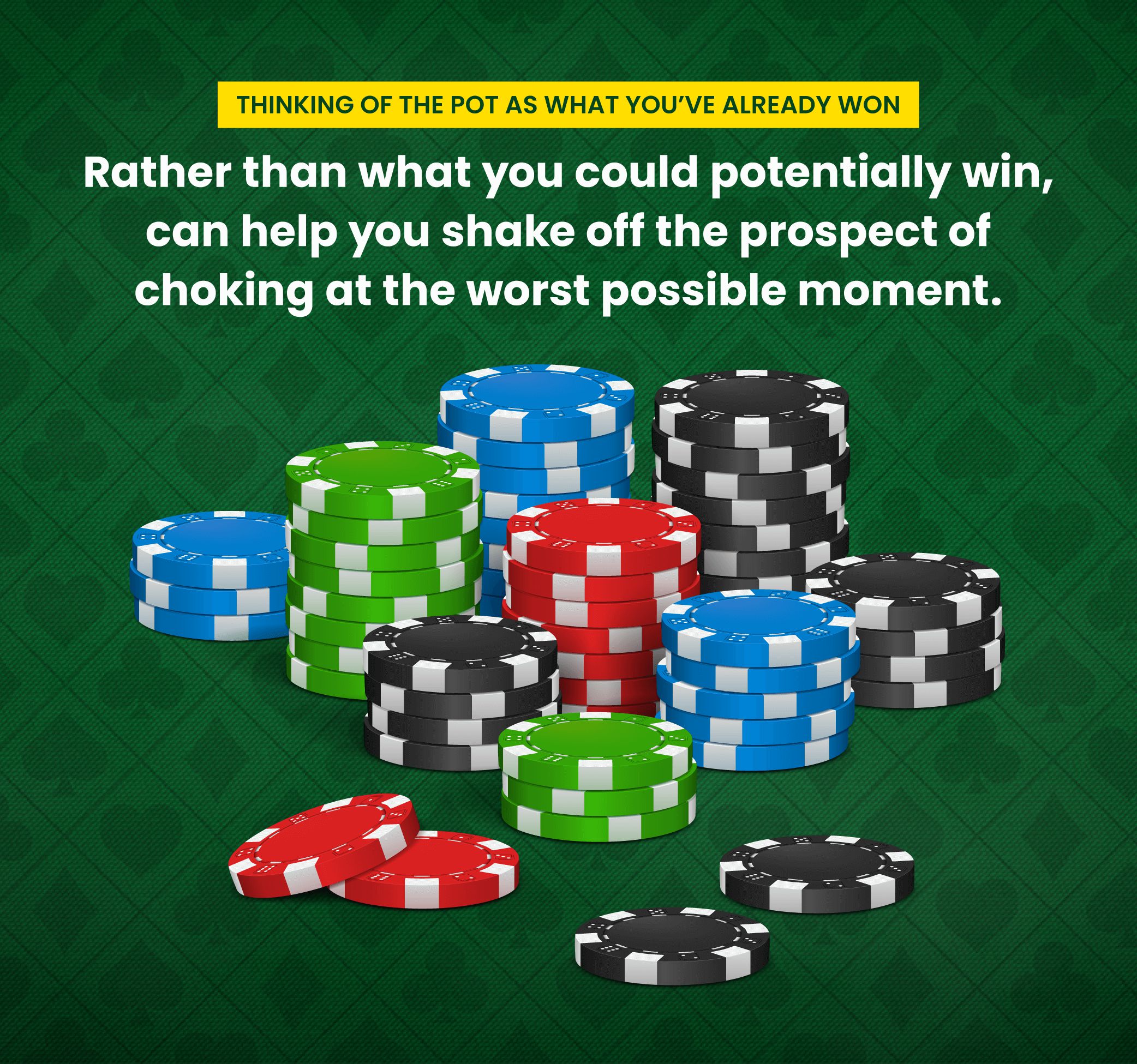
Hands Off - A Mindful Approach
Mindfulness can be a powerful tool against anxiety and stress. These days we’re understanding ever more about the triggers of stress, and experts are learning how to mindfully tackle its presence when it leads to a negative mindset.
Mindfulness is all about placing our sole attention on the here and now, and not letting external factors affect us as we encounter a difficult moment. Even and perhaps especially at the poker table, you can use mindfulness to help steady your mental focus.
In his book, “The Emotional Life of Your Brain”, Richard Davidson of the University of Wisconsin sets out meditation as one of the ways you can train your brain’s ‘neuroplasticity’, and improve the way you handle setbacks. He also identifies emotional resilience as one of the ‘Four Constituents of Well-Being’.
One of the key techniques Davidson and other researchers have found for developing this emotional resilience is the rehearsal of letting go of, or taking our ‘hands off’ our thoughts and distractions, then returning our attention to a chosen topic or task.
No less a poker ace than Daniel Negreanu has himself previously written about his experiences with mindfulness and meditation at the poker table:
“When people start with meditation they often think they are doing it wrong because they are unable to clear their mind of thoughts. There is no wrong way to do meditation, thoughts will come and go, the mind is designed to have thoughts. Over time, the thoughts don't go away, but you become better at simply noticing them and separating yourself from your mind’s thoughts.”
Key takeaway: The better you can manage your thoughts and exclude additional stress at the table, the better you can perform under pressure by focusing on the actual physical game in front of you. Try a bit of meditation – it might just help!
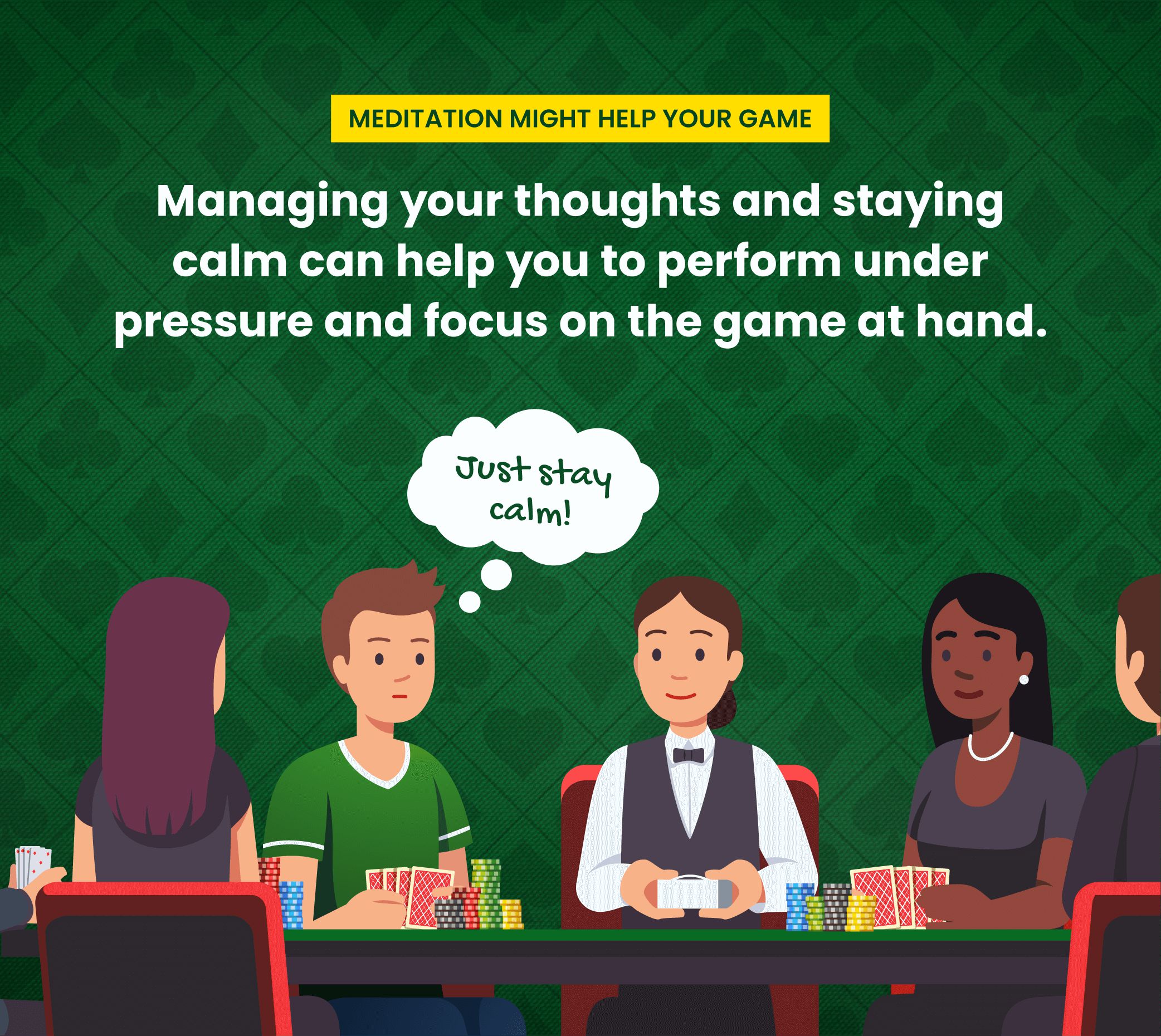
Driven to distraction
‘Emotional regulation’ may sound like a tall order when the cards are in play, but it simply means trying to control whatever emotion you’re feeling. For example, reducing a sad feeling by recalling a happy or funny memory, or listening to your favourite songs to put you in the party mood.
Yannick A. Balk and colleagues used a golf putting task to determine which emotional regulation strategies proved most successful – and found that ‘reappraisal’ and ‘distraction’ were key tactics used to maintain performance. Putters in the reappraisal method group were asked to tell themselves that they were only playing a game, while those using distraction as a method were asked to think about a song they knew off by heart while they played.
Compared to a control group, the results were pretty intriguing. Not only did the reappraisal group see no decline in performance, but players in the distraction group actually reported an improved performance.
Key takeaway: The distraction play might explain why we’re seeing more players at the poker table with headphones on! It might be worth investing in a pair…
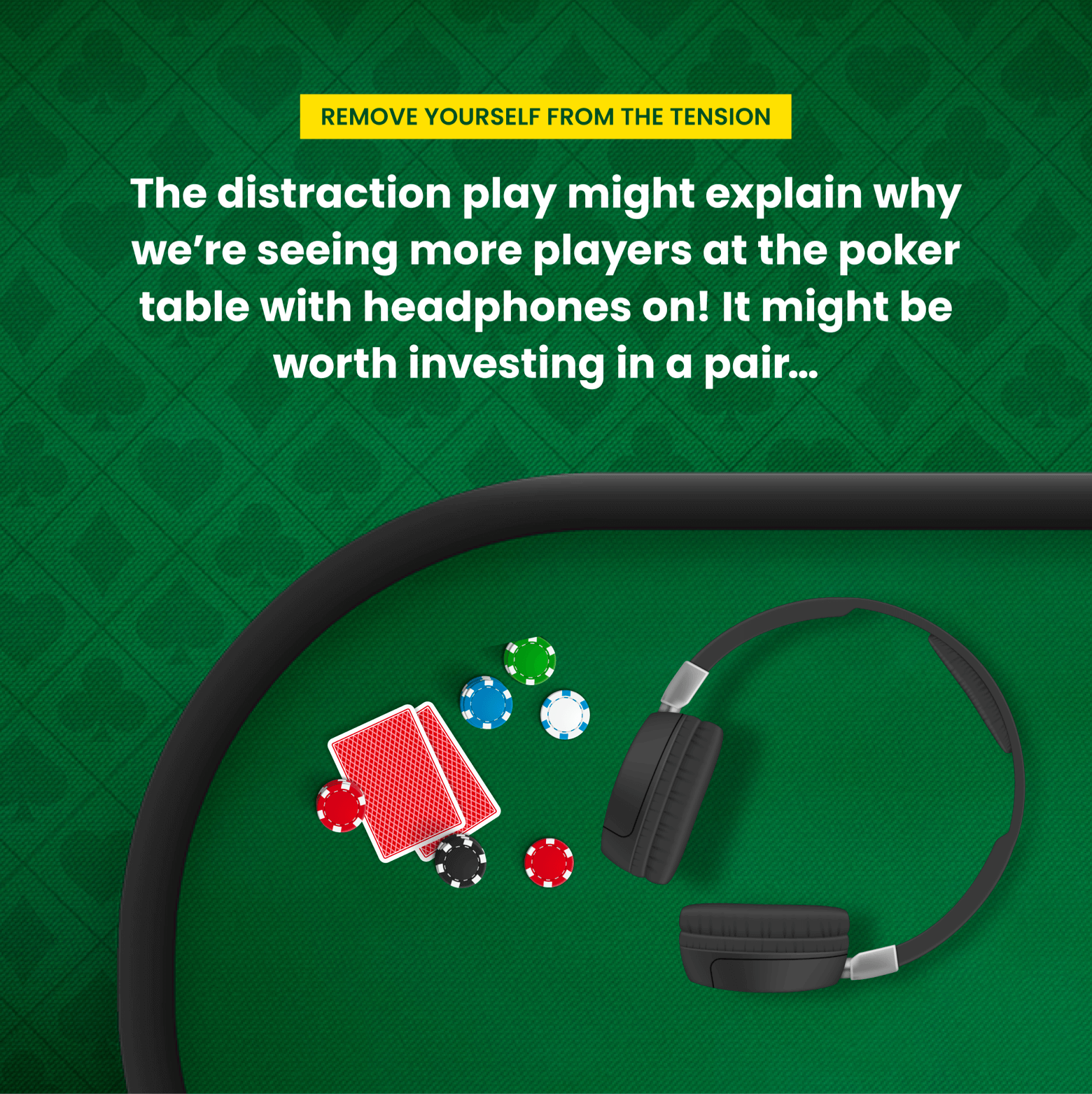
Other tips to help keep you cool and collected under pressure
There are a few simple activities you can use to help you deal with the body’s release of stress hormones – such as adrenalin and cortisol. These chemicals are used to prep your body for a 'fight-or-flight’ situation; extremely useful for our ancestors when they routinely faced wild animals, but not so much for us these days!
Next time you’re getting ready for a stint at the poker table, a job interview or even just a stressful social situation, the tips below – based on the studies we’ve looked at – may help you to maintain composure and focus on the task at hand.
- Take deep breaths. Use simple deep breathing exercises to maintain focus and reduce the feeling of pressure. Deep breaths instruct your body to lower heart rate and slow the release of cortisol.
- Limit your caffeine intake. Caffeine is no substitute for a good night’s sleep. (See the next tip.) In fact, it actually raises stress levels to the point where, according to author Travis Bradberry , it can allow our emotions to overrun our behaviour and triggers a constant state of fight-or-flight.
- Get a good night’s sleep. Studies show that missing a good night’s sleep can result in elevated cortisol levels the next evening. Practise good sleep hygiene at bedtime, winding down to sleep at regular set hours, and cutting down on screen time too.
- Reappraise. Reframe the situation to remove the pressure you might be otherwise putting on yourself. Like the players who are trying to keep hold of that prize pot rather than win it, or the golfers telling themselves it’s only a game.
- Distract. Listen to your favourite music to boost your mood, or think about a happy time if you’re faced with difficulty.
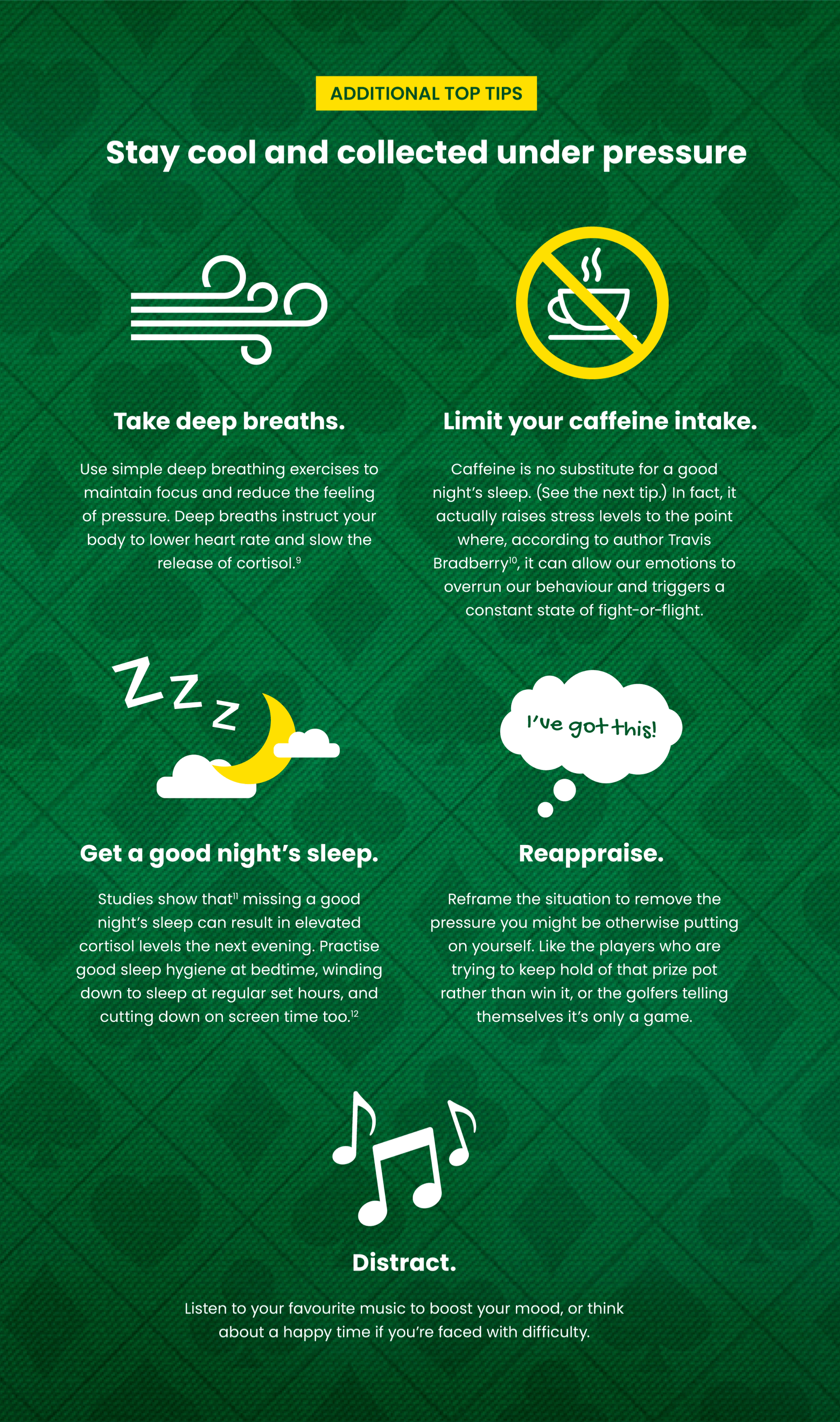
Ready to try out your cool new tactics at the tables? Head to 888poker today to find a game that suits you.
